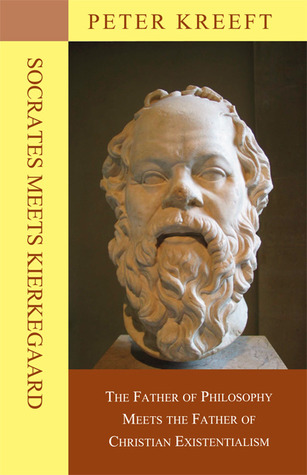- Biblia
- Leer la Biblia
- Versiones de la Biblia
- Verso del dia
- Planes de lectura
- Versos por tema
- Books of the Bible
- Imágenes De La Biblia
- Estudio
- Comentarios
- Concordancias
- Diccionarios bíblicos
- Enciclopedias bíblicas
- Sermones
- Bible Atlas & Maps
- BP Wiki
- Devocionales
- Devocionales de hoy
- Light of the World
- Todos los devocionales
- Inspirational Quotes
- Más
- Picture Quotes
- Videos
- Inspirador
- Estudio Bíblico
- Lo que dice la Biblia
- Bible Q&As
- Daily Bread
- Bible by Genre
- Bible Stories
- Random Bible Verse
- Comunidad
- Store
Socrates Meets Kierkegaard: The Father of Philosophy Meets the Father of Christian Existentialism
by Peter Kreeft
No philosopher since Augustine had more strings to his bow than Søren Kierkegaard. He wrote from many points of view, in many literary styles, about many topics (not all of them traditional philosophical topics). He should have written novels or plays, for he turned himself into a different character every time he wrote a new book. Is there a philosopher who has ever exceeded the quantity, quality and variety of his output in such a short time?
And out of it all shone forth the three most important qualities we want in any writing, in fact in any human work of art: truth, goodness, and beauty; intelligence, holiness, and charm. Who since Augustine has better combined all three? (C. S. Lewis, perhaps; who else?) And these three are the three greatest things in the world, the only three things that never get boring, and that everyone desires, with the very deepest desires of the heart, in unlimited quantity.
Yet this amazing variety in SK had a tight and total unity. To the despair of his secular admirers, he explicitly identified his vocation as a kind of undercover missionary. He said that the ultimate task of every sentence he ever wrote was the exploration of “what it means to become a Christian.” His many means to this single end were very varied, and constituted a kind of end-run around both deductive and inductive logic into a seductive logic, which he called “indirect communication.” It is the strategy of the novelist or playwright: to show rather than to tell.
And out of it all shone forth the three most important qualities we want in any writing, in fact in any human work of art: truth, goodness, and beauty; intelligence, holiness, and charm. Who since Augustine has better combined all three? (C. S. Lewis, perhaps; who else?) And these three are the three greatest things in the world, the only three things that never get boring, and that everyone desires, with the very deepest desires of the heart, in unlimited quantity.
Yet this amazing variety in SK had a tight and total unity. To the despair of his secular admirers, he explicitly identified his vocation as a kind of undercover missionary. He said that the ultimate task of every sentence he ever wrote was the exploration of “what it means to become a Christian.” His many means to this single end were very varied, and constituted a kind of end-run around both deductive and inductive logic into a seductive logic, which he called “indirect communication.” It is the strategy of the novelist or playwright: to show rather than to tell.
BUY NOW
Paperback, 160 pages
Published June 30th 2014 by St. Augustines Press (first published April 20th 2013)
Suscribir
© 2025 Bibleportal.com Reservados todos los derechos.

Peter John Kreeft is a professor of philosophy at Boston College and The King's College, and author of numerous books as well as a popular writer on Christian theology, and specifically Roman Catholic apologetics. He also formulated together with Ronald K. Tacelli, SJ, "Twenty Arguments for the Existence of God".
Kreeft took his A.B. at Calvin College (1959), and an M.A. at Fordham University (1961). In the same university he completed his doctoral studies in 1965. He briefly did post graduate studies at Yale University. He joined the Philosophy faculty of the Department of Philosophy of Boston College in 1965. In 1994 he was a signer of the document Evangelicals and Catholics Together.
... Show more